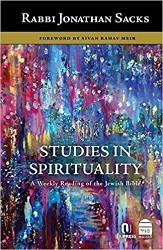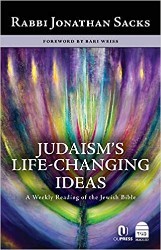Fans of Rabbi Sacks will know that he was a prolific writer, publishing weekly divrei Torah that he sent out to a massive listserv. Every so often, he collected these essays into a book, such as Jewish Ethics (2016) and Lessons in Leadership (2015). The tenth book in this series, I Believe, is an important addition to the oeuvre. The topics covered by fifty-four essays in the book are more wide-reaching than in his previous works.
In his final year of writing his weekly column, “Covenant and Conversation,” Sacks included a bolded section at the end of each essay, which began with the words “I believe” and provided readers with a pithy summary. These postscripts read like final lessons from Sacks’s life and career. Although Sacks didn’t intend them to be read as a single book, it is clear that the essays belong together (as is stated in the editor’s note), offering a final gift to the author’s community of learners following his passing in 2020.
As with the rest of his books, I Believe has all the hallmarks of Sacks’s erudition, thoughtfulness, and cultural sensitivity. Rabbi Sacks has the ability to make ancient texts speak to modern philosophy, psychology, science, and arts. To him, everything is Torah. Life bolsters Jewish learning just as Jewish learning elevates life. Sacks dazzles his readers; he has so many texts, both old and new, at his fingertips.
More than his previous works, I Believe engages with classical Jewish teachings. There are fewer anecdotes given, contemporary ideas cited, and historical moments explored than in his aforementioned books on leadership or ethics — which is not to say that these elements don’t pack a punch when they are invoked. The book covers a diversity of topics, from why education is central to Judaism, to the need to speak out in the name of justice, to why giving to others shapes our sense of self. There is something in I Believe for everyone.
Reading this book can feel surreal now that he has passed on. It’s unclear whether he knew these essays would be his last when he began writing them. In any case, one can’t help but interpret the book as a final testament to the values of this intellectual giant, a swan song of his storied career. The fact that each essay ends with the words “I Believe” adds to this impression. Likewise, since Rabbis Sacks makes generous reference to his previous written works, a first-time reader of Sacks will leave I Believe with a general understanding of some of these other books’ major themes and will certainly be inspired to pick them up and delve further into them.
There are few in the Jewish world who are as intelligent, engaged, accessible, and creative as Rabbi Sacks. Every essay he wrote was a gift. Thankfully, I Believe gives us fifty-four more.
Rabbi Marc Katz is the Rabbi at Temple Ner Tamid in Bloomfield, NJ. He is author of the books Yochanan’s Gamble: Judaism’s Pragmatic Approach to Life (JPS) chosen as a finalist for the PROSE award and The Heart of Loneliness: How Jewish Wisdom Can Help You Cope and Find Comfort (Turner Publishing) which was chosen as a finalist for the National Jewish Book Award.





